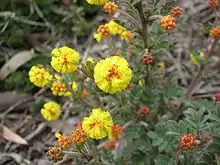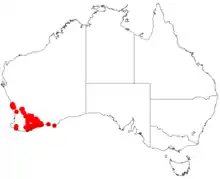Acacia moirii
Acacia moirii, commonly known as Moir's wattle,[1] is a subshrub which is endemic to the south-west of Western Australia.[2] It grows to between 0.15 and 0.6 metres high and has densely hairy leaflets.[2] The globular golden-yellow flower heads appear from May to August, followed by hairy seed pods which are around 4 cm long and 5 to 6 mm wide.[2]
| Acacia moirii | |
|---|---|
 | |
| Acacia moirii subsp. dasycarpa | |
| Scientific classification | |
| Kingdom: | Plantae |
| Clade: | Tracheophytes |
| Clade: | Angiosperms |
| Clade: | Eudicots |
| Clade: | Rosids |
| Order: | Fabales |
| Family: | Fabaceae |
| Clade: | Mimosoideae |
| Genus: | Acacia |
| Species: | A. moirii |
| Binomial name | |
| Acacia moirii | |
 | |
| Occurrence data from AVH | |
| Synonyms | |
|
Racosperma moirii (E.Pritz.) Pedley | |
Taxonomy
The type specimen was collected near Cape Riche by A.J. Moir in 1901.[2]
Three subspecies are currently recognised:
- A. moirii subsp. dasycarpa Maslin
- A. moirii E.Pritz. subsp. moirii
- A. moirii subsp. recurvistipula Maslin
Distribution
The species occurs on sandplains, undulating plains, hills and rises in an area between Eneabba, Manypeaks and Jerdacuttup as well as east of Esperance in the Cape Arid area.[3]
See also
References
- "Acacia moirii". Australian Plant Name Index (APNI), IBIS database. Centre for Plant Biodiversity Research, Australian Government, Canberra. Retrieved 6 July 2009.
- "Acacia moirii". World Wide Wattle. Retrieved 9 July 2012.
- "Acacia moirii". FloraBase. Western Australian Government Department of Parks and Wildlife.
This article is issued from Wikipedia. The text is licensed under Creative Commons - Attribution - Sharealike. Additional terms may apply for the media files.